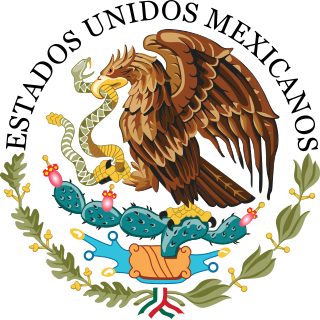
The politics of Mexico function within a framework of a federal presidential representative democratic republic whose government is based on a multi-party congressional system, where the President of Mexico is both head of state and head of government. The federal government represents the United Mexican States and is divided into three branches: executive, legislative and judicial, as established by the Political Constitution of the United Mexican States, published in 1917. The constituent states of the federation must also have a republican form of government based on a congressional system as established by their respective constitutions.

The Party of the Democratic Revolution is a state-level social democratic political party in Mexico. The PRD originated from the Democratic Current, a political faction formed in 1986 from the Institutional Revolutionary Party (PRI). The PRD was formed after the contested general election in 1988, which the PRD's immediate predecessor, the National Democratic Front, believed was rigged by the PRI. This sparked a movement away from the PRI's authoritarian rule.

Andrés Manuel López Obrador, also known by his initials AMLO, is a Mexican politician who is the 65th and current president of Mexico since 2018. He previously served as Head of Government of Mexico City from 2000 to 2005.

Roberto Madrazo Pintado is a Mexican politician and member of the Institutional Revolutionary Party. He was the candidate of the alliance between his party and the Ecologist Green Party of Mexico (PVEM) in the 2006 Mexican presidential election. He served as Governor of Tabasco from 1995 to 2000.

The Labor Party is a political party in Mexico. It was founded on 8 December 1990. The party is currently led by Alberto Anaya.

Citizens' Movement is a Mexican centre-left political party. The party was founded in 1999, under the name Convergence for Democracy, which was then shortened to Convergence in 2002 and changed to Citizens' Movement in 2011.
Andrés Rafael Granier Melo is a former Mexican politician. A member of the Institutional Revolutionary Party (PRI), he served as Governor of Tabasco from 2007 to 2015.

The Coalition for the Good of All was a left-wing coalition created by the Party of the Democratic Revolution (PRD), Convergence and the Labor Party (PT) to support Andrés Manuel López Obrador as a candidate for the presidency of Mexico in the general election of 2006. The coalition also presented joint candidates for Congressional and local elections.

Manuel Andrade Díaz is a Mexican politician affiliated with the Institutional Revolutionary Party PRI and former Governor of Tabasco. He holds a law degree from the University Juárez Autónoma of Tabasco and qualified in Electoral Law and Parliamentary Law.
César Raúl Ojeda Zubieta is a Mexican politician, member of the Party of the Democratic Revolution, previously member of the Institutional Revolutionary Party; is for third consecutive occasion, candidate of the PRD for Governor of Tabasco.

General elections were held in Mexico on Sunday, 1 July 2012. Voters went to the polls to elect a new President of the Republic to serve a six-year term, replacing Felipe Calderón, 500 members of the Chamber of Deputies and 128 members of the Mexican Senate.
The 2012 gubernatorial election in the Mexican state of Tabasco we held on Sunday, July 1, 2012. Incumbent Tabasco Governor Andrés Granier Melo of the Institutional Revolutionary Party (PRI) is retiring due to mandatory term limits, which limit all Mexican state governors to one, six-year term in office. The Tabasco gubernatorial election coincided with the 2012 Mexican presidential and general elections.

General elections were held in Mexico on 1 July 2018. Voters elected a new President of Mexico to serve a six-year term, 128 members of the Senate for a period of six years and 500 members of the Chamber of Deputies for a period of three years. It was one of the largest election days in Mexican history, with most of the nation's states holding state and local elections on the same day, including nine governorships, with over 3,400 positions subject to elections at all levels of government. It was the most violent campaign Mexico has experienced in recent history, with 130 political figures killed since September 2017.

Adán Augusto López Hernández is a Mexican politician, lawyer and notary public who served as governor of Tabasco from January 2019 until August 2021, date on which he was appointed Secretary of the Interior by President Andrés Manuel López Obrador. López Hernández is a founding member of the political party MORENA and has formerly held office as senator and congressman in the Tabasco State Congress (2007-2009), the LXI Legislature of the Federal Chamber of Deputies (2009-2012) and the Senate in its LXIV Legislature (2012-2018).
The National Regeneration Movement, commonly referred to by its syllabic abbreviation Morena, is a major left-wing populist political party in Mexico. As of 2023, it is the largest political party in Mexico by number of members; it has been the ruling party since 2018, and won a second term in the 2024 general election.

Social Encounter Party was a Mexican conservative political party established on the national level in 2014 and dissolved in 2018. It was part of the coalition Juntos Haremos Historia with the National Regeneration Movement and Mexico's Labor Party for the 2018 Mexican election.

Juntos Haremos Historia was a Mexican political coalition encompassing the National Regeneration Movement (MORENA), Labor Party (PT), and Social Encounter Party (PES), the latter of which was consequently absorbed into the National Regeneration Movement, to compete in the 2018 general election. Its current leader, as well as their presidential candidate, is Andrés Manuel López Obrador, who won the election.

Delfina Gómez Álvarez is a Mexican politician affiliated with the National Regeneration Movement (MORENA) who has served as the Governor of the State of Mexico since 2023. She previously served as the head of the Secretariat of Public Education appointed by President Andrés Manuel López Obrador. She served as a senator from the State of Mexico in the LXIV Legislature of the Mexican Congress. She also has served as a federal deputy and mayor.
The Progressive Movement was a political alliance formed between the Democratic Revolution (PRD), Labor Party (PT) and the Citizens' Movement (MC), which contested the 2012 Mexican general election. Its presidential candidate Andrés Manuel López Obrador came in second place, losing to Enrique Peña Nieto.

Rubén Rocha Moya is a Mexican politician and educator who has served as the Governor of Sinaloa since 2021. A member of the National Regeneration Movement (MORENA), Rocha previously served in the Senate of Mexico from 2018 to 2021.














